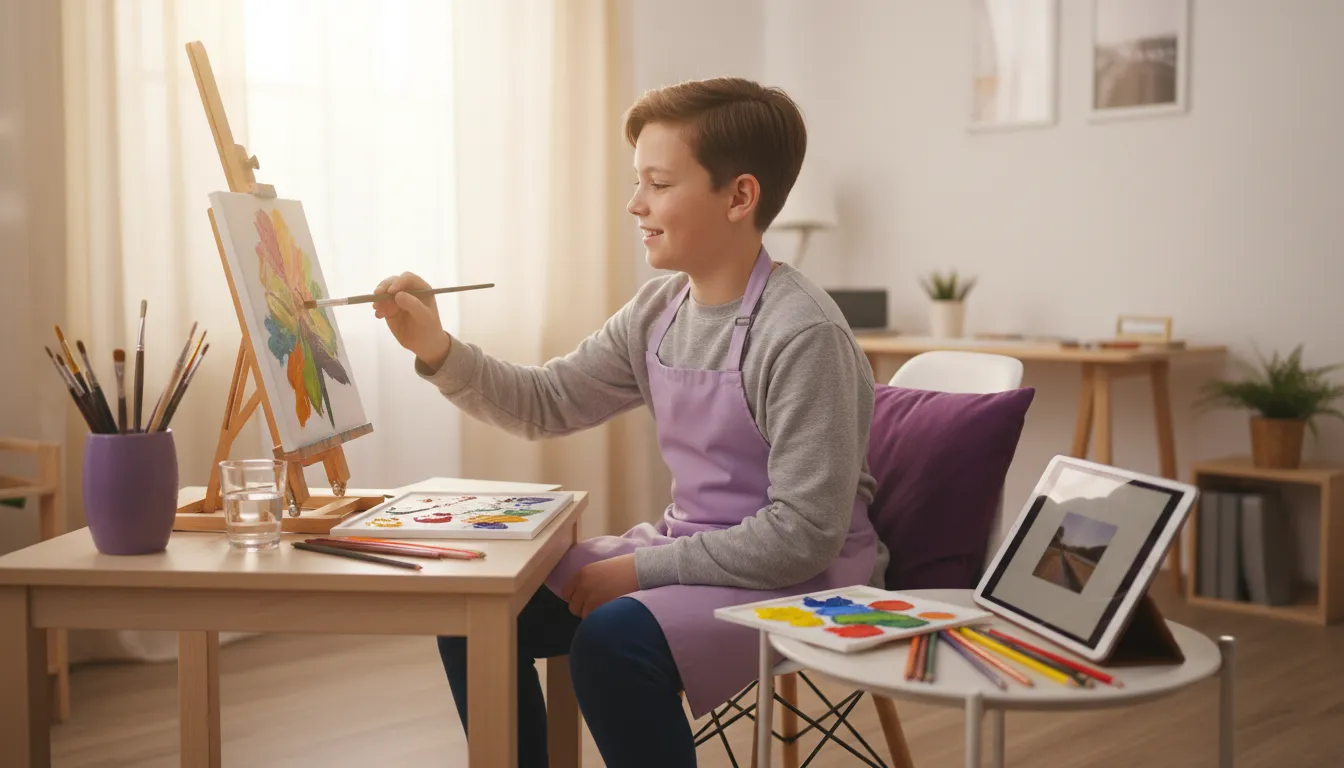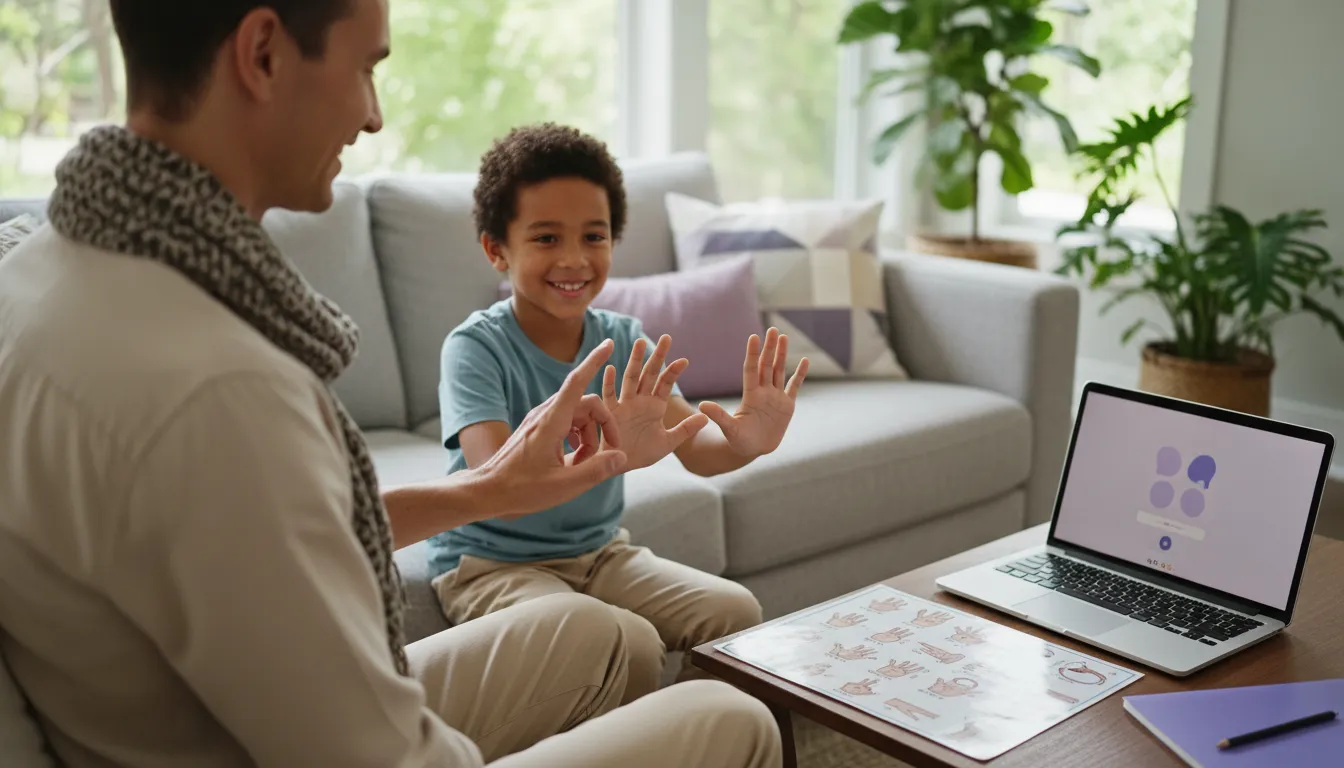Advanced words for vocabulary give children the tools to think more clearly, tell richer stories, and connect more deeply with the world around them. Each sophisticated word a child learns becomes a building block for expressing complex ideas, understanding nuanced concepts, and approaching challenges confidently. Over time, these words shape stronger communication skills and a deeper curiosity about learning.
When learning vocabulary words feels like an adventure instead of a chore, kids discover how language can bring their passions to life. From interactive games that make word practice fun to real-world experiences that help terms stick, advanced vocabulary becomes an exciting part of everyday growth. At Outschool, live online classes make advanced vocabulary engaging and accessible, with passionate teachers guiding learners to explore language meaningfully.
Why advanced vocabulary matters for young learners
Children who build a strong vocabulary unlock a deeper understanding across every subject. A wide range of words helps them process ideas more easily, think critically, and confidently approach reading. Instead of getting stuck on decoding, they can focus on meaning, which makes learning more engaging. Advanced vocabulary also acts as a bridge between their thoughts and their ability to communicate.
Starting this foundation early makes a big difference. Challenging words encourage curiosity, sharpen comprehension, and spark a love of language that grows year after year. Exposure to rich vocabulary across subjects creates momentum, fueling a lifelong appetite for new words and the ideas that come with them.
Fun ways to teach advanced vocabulary words at home
The most effective and fun ways to teach advanced vocabulary words happen when learning feels like play rather than work. Since children need multiple exposures to fully master new words, creating engaging opportunities turns vocabulary into a joyful, everyday part of family life.
- Turn car rides into word adventures: Play games like "Riddle Me This" during car rides, where kids create clues for advanced words like "magnificent" or "perplexing" for family members to guess.
- Launch vocabulary scavenger hunts: Send children around your home or neighborhood, challenging kids to find objects that match sophisticated descriptors like "translucent," "symmetrical," or "miniature."
- Bring words to life: Act out advanced words through charades and storytelling, where children physically demonstrate concepts like "trudging," "whispering," or "celebrating," making abstract vocabulary concrete and memorable.
- Create personalized vocabulary journals: Encourage kids to illustrate new words, write original sentences, and track their favorite discoveries, turning word collection into a creative hobby.
- Weave advanced words into daily conversations: Use meals, bedtime stories, and family discussions, since parents' vocabulary contributes to many words children learn.
- Start a "word of the day" tradition: by posting new vocabulary on the refrigerator each morning and challenging everyone to use it in conversation before dinner, creating natural repetition and reinforcement.
By transforming vocabulary into play, you create an environment where advanced words feel exciting, memorable, and meaningful. The result is stronger language skills and a shared family tradition of joyful learning. Over time, these simple practices nurture confidence, spark curiosity, and give your child the tools to express themselves with clarity and creativity.
Integrating advanced words into real-world experiences
Real-world vocabulary activities transform abstract words into concrete, memorable experiences that stick with children long after the moment passes. You help your child connect language to lived experiences that deepen understanding and recall by weaving advanced words into outings, passions, and everyday observations.
- Turn outings into word adventures: At a science museum, words like luminescent or aerodynamics come alive while at a history center, terms like relic or artifact stick naturally.
- Model richer language in the moment: Instead of saying “that’s cool,” encourage phrases like “the butterfly’s wings have an iridescent quality” or “this building shows remarkable symmetry.”
- Build sensory and emotional connections: Vocabulary sticks when tied to sights, sounds, and feelings. Children remember "celestial" because they felt awe under the stars.
- Use project-based learning for reinforcement: Extended projects, like creating a nature journal or building model airplanes, require kids to use words repeatedly, which deepens retention.
- Tie new words to existing passions: Whether your child loves art, sports, or science, connect vocabulary to those interests. This way, words like chiaroscuro, momentum, or composition suddenly feel relevant.
- Encourage them to be vocabulary explorers: Invite kids to seek advanced words during experiences and use them to describe what they notice, building confidence in applying new language.
By linking vocabulary to your child’s real-world experiences, you transform words from abstract concepts into tools for exploration and expression. The result is a stronger vocabulary and a more profound love of language woven into the fabric of their everyday lives.
FIRST MONTH FREE!
Get support that meets kids where they are.
Learn moreCommon vocabulary mistakes to avoid
Even the most dedicated parents and educators sometimes fall into habits that make vocabulary building harder than it needs to be. These missteps can unintentionally turn word learning into frustration instead of discovery, or leave kids memorizing without truly understanding.
- Overloading kids with too many words at once: When children are introduced to long lists of new words, they may remember definitions briefly but struggle to retain them. A more effective approach is choosing a small handful, just three to five words per week, and weaving them into different contexts.
- Focusing only on definitions: Advanced vocabulary becomes powerful when children use words, not just recite them. If learning is limited to “look it up and memorize,” kids lose the chance to connect the word to experiences or feelings.
- Making learning too formal: While worksheets and drills have their place, relying only on rigid methods can drain the joy from vocabulary. Children remember words better when tied to play, like scavenger hunts or journaling.
- Ignoring learning styles: Every child learns differently. Visual learners benefit from sketching word webs or illustrating meanings. Kinesthetic learners thrive when they act out words, while auditory learners absorb new terms through rhymes, songs, or discussions.
- Treating vocabulary as an isolated subject: Words grow stronger when they appear across different parts of life. A child might learn momentum in science, balance in gymnastics, and rhythm in music, all reinforcing the same concept in different ways.
Avoiding these common mistakes ensures vocabulary learning feels supportive and enjoyable, not stressful. By keeping goals realistic, making learning interactive, and honoring your child’s unique style, you’ll create an environment where advanced words naturally become part of daily life.
Frequently asked questions (FAQs) about teaching advanced vocabulary
These frequently asked questions address the most common concerns homeschooling parents have about vocabulary enrichment, offering practical solutions you can implement today.
What makes advanced vocabulary stick better than simple memorization?
Advanced vocabulary becomes memorable when children connect new words to emotions, experiences, and personal passions rather than just definitions. Interactive activities like creating visual associations and using words in storytelling help build lasting neural pathways that make recall natural and automatic.
How can I tell if my child is ready for a more challenging vocabulary?
Watch for signs like frequently asking, "what does that mean?", using descriptive language in their speech, or showing curiosity about word origins and meanings. Children who enjoy wordplay, rhyming, or making up their own words often thrive with advanced vocabulary challenges that match their natural love of words.
What's the best way to introduce new words without overwhelming my child?
Start with 3–5 new words per week and introduce them through multiple contexts, reading, conversation, and hands-on activities. Brain-based vocabulary activities show that spacing out exposure over several days, rather than cramming, leads to better retention and real understanding.
How can I adapt vocabulary learning for children with different learning styles?
Visual learners benefit from creating colorful word webs connecting "luminous" to images of fireflies and stars. In contrast, kinesthetic learners need movement-based activities like acting out word meanings or building vocabulary through dance.
Auditory learners thrive with songs, rhymes, and verbal discussions about word origins, and neurodivergent children respond well to structured routines that incorporate their favorite topics into vocabulary exploration.
Empower your child's language journey with advanced words
Advanced words for vocabulary give children the power to express themselves with clarity, creativity, and confidence. Each new word adds depth to their thinking, strengthens storytelling, and opens doors to understanding complex ideas. When advanced vocabulary becomes part of everyday learning, it shapes communication skills and a lasting curiosity about language.
Small-group, real-time learning turns vocabulary into a collaborative adventure where children practice, ask questions, and gain confidence together. At Outschool, live online classes for vocabulary connect learners with inspiring teachers and peers, where they might describe a character as resilient or mischievous, debate a scientific hypothesis, or capture a feeling as melancholy or triumphant.






.svg)
.svg)







